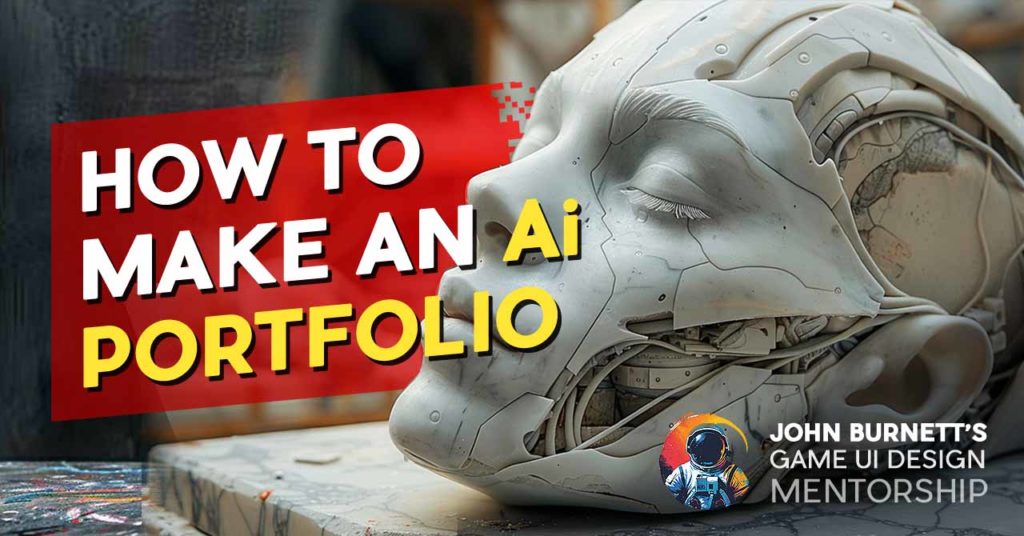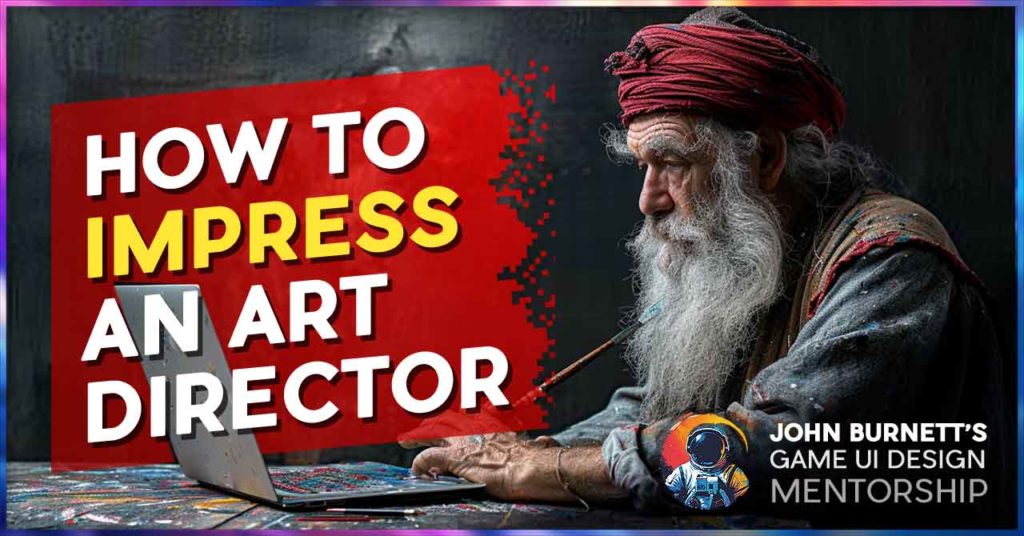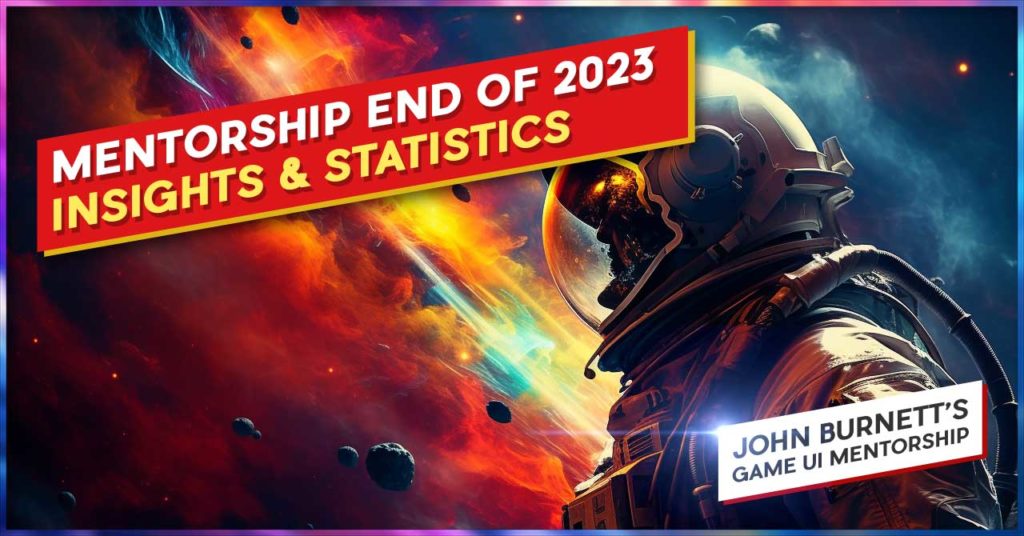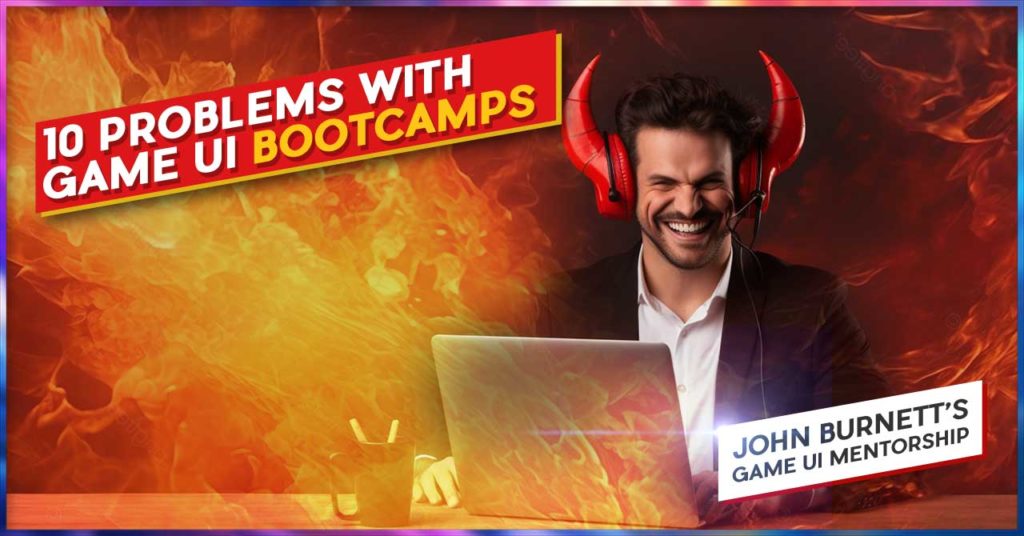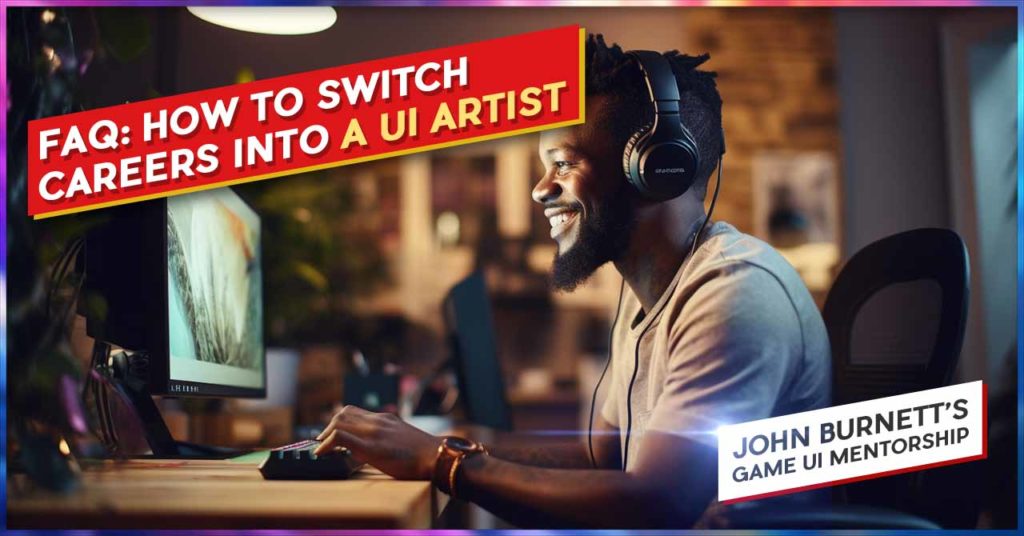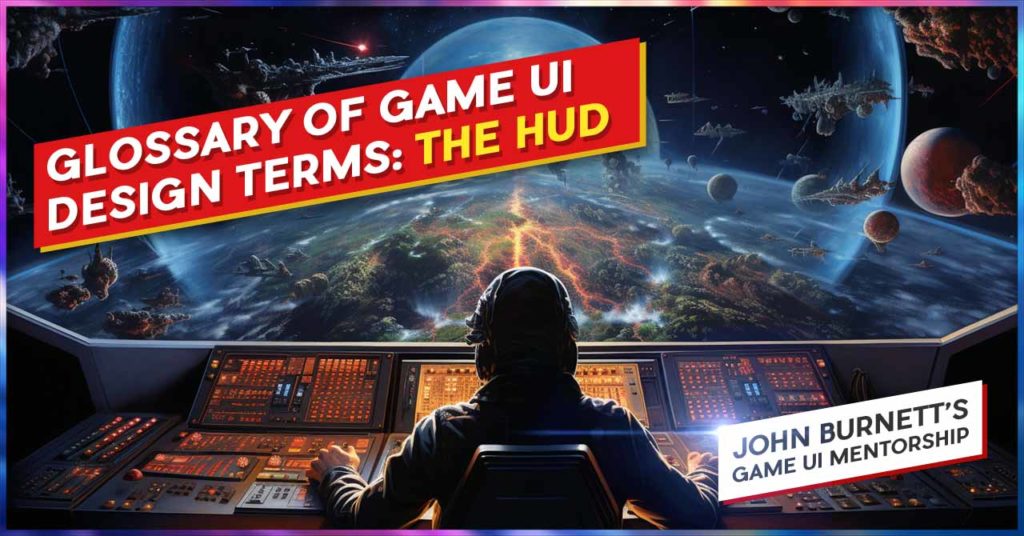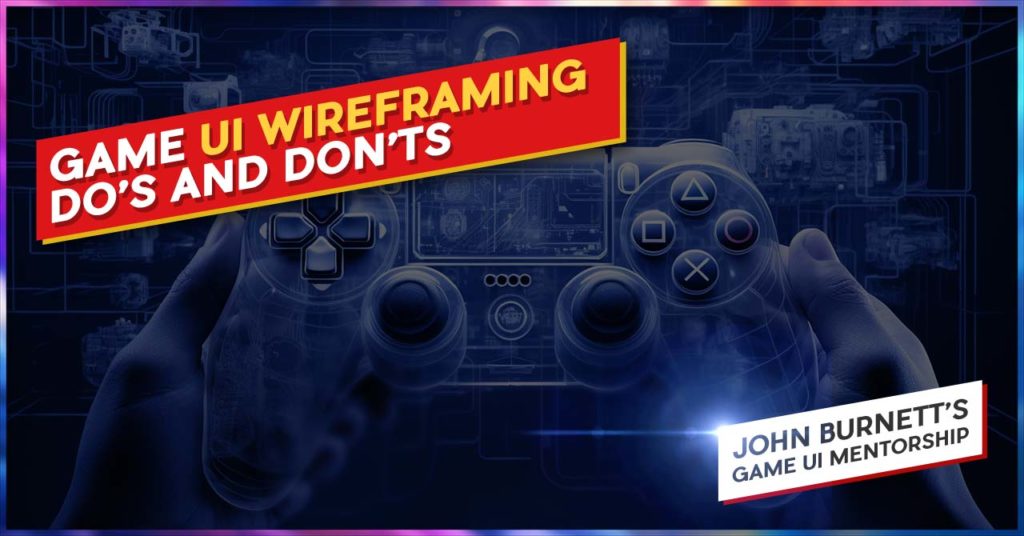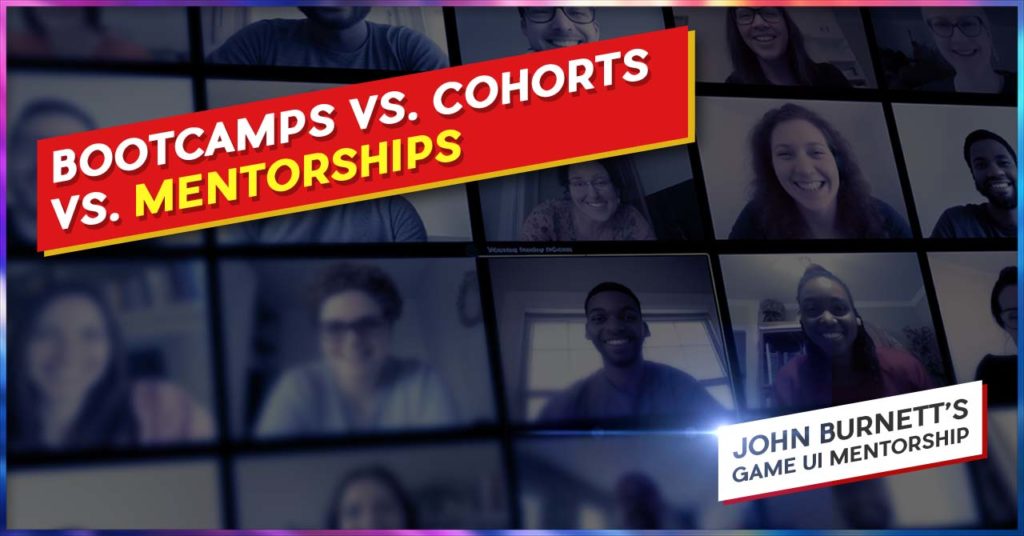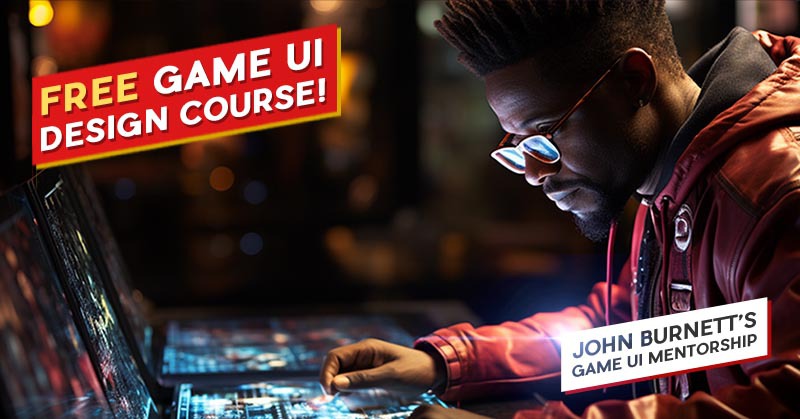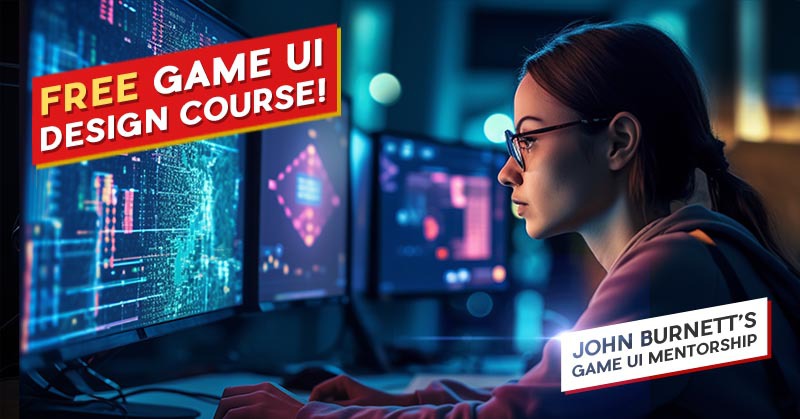GAME UI DESIGN FREQUENTLY ASKED QUESTIONS
GAME UI DESIGN FAQ: HOW TO SWITCH CAREERS AND BECOME A GAME UI ARTIST
 By John “TheWingless” Burnett
By John “TheWingless” Burnett
Game Art Director, Senior UI Artist, Remote Game UI Mentor
Need 1-on-1 help with your Game UI Portfolio? Join my exclusive Game UI Design Course!
GAME UI DESIGN FAQ: HOW TO SWITCH CAREERS AND BECOME A GAME UI ARTIST
GAME UI DESIGN FREQUENTLY ASKED QUESTIONS
Now, I know what you’re thinking, “There’s no way, John. There’s just no way for me to break into the Industry and make honest to goodness real video games.”
–
It may surprise you to know everybody inside the Industry says that. Everyday.
–
As one of the few (only?) Game UI Mentors, let me take a minute to allay all your fears and inspire you to enter one of the greatest professions I’ve ever known. Greetings, aspiring Game UI artists! Ready to embark on a transformative journey into the captivating world of Game UI Design? Let’s navigate through some frequently asked questions that will illuminate the path to your career in pixel perfection.

The people who makes games are incredibly diverse, talented and come from a kaleidoscopic array of backgrounds (just like you!)
FAQ: No, but seriously: can I Really Switch Careers and break into the video game Industry?
Absolutely! The world of Game UI Design is open to enthusiasts from all backgrounds, and the barrier for entry is a logical mind, a creative spark and very little by way of expensive software. You’ll need a few keys to break into the kingdom: a Portfolio and the skills to stuff it full of awesome content. But whether you’re a seasoned graphic designer, a code maestro seeking a change, or just a loveable dork like me who wants their shot, the realm of Game UI welcomes diversity and dreamers. Yes, you can do this.
FAQ: Is a Degree in Game UI Design a Necessity?
Not in the slightest. In fact, some Artists and Designers flat-out leave off their education off their resume(!). While a degree relating to Game UI Design may be advantageous to certain biases in the Art Director, it will never stop you from getting a game job – and I can’t think of any school off the top of my head that would give you a golden ticket… Having no education is also no barrier for entry. Many successful UI artists have forged their paths through self-learning and a robust portfolio. Equip yourself with design tools, master wireframing, and showcase your creations in a portfolio that speaks volumes about your skills. Here, we’re about results – we couldn’t care less about what school you went to. The school ain’t doing the work!
FAQ: What Design Software Should I Get Comfortable With?
The one industry-standard tool for console & PC UI Design is Adobe XD (old-timey Photoshop for me!). Miro is also making the rounds as the standard for remote collaboration, mostly because of its simplicity for non-designers to use. Figma is not regularly used, since the assets you create can not be easily transferred into an engine. That’s why Figma is the standard for web and apps; smooth transition to a finished product. No such through-path exists in console/pc gaming – so no Figma for you. Also, you’ll spook a team if you hand over an Illustrator file – save yourself the embarrassment!
FAQ: Can I Pursue Game UI Design Part-Time?
Absolutely! Many aspiring Game UI artists begin their journey part-time, though the quality of bootcamps and cohorts are decidedly poor. Whether you are going all-in or part-time, a Mentorship is the only real choice for you. Your time is precious, especially if its part-time, so find a solution that creates bespoke lessons just for you! If you can’t manage that, you can always dive deep into the bevvy of guides I’ve written here.
FAQ: So just how creative can you get as a Game UI Artist?
Way more creative than you ever could as a dry old website or app designer! Honestly, I wonder how those people get out of bed in the morning – the creative lengths you can go to in game UI UX are profound. On the one hand, you can be wonderfully ornate, artistic, expressive and daring. On the other, you can be brilliant, ingenious, and pioneering in your engineering. In every possible way your brain can light up like a Christmas tree, Game UI has it. It also has the unique benefit of being the most difficult form of UI UX to master. Meaning: if you can do Game UI, you can do anything UI-related, guarantied.
FAQ: I don’t have anything game-related in my Portfolio, is that a problem?
It’s a show-stopping problem! No studio with a sense of self-preservation will hire somebody without proof of even limited game art asset development. No, you do not need to come from a gaming background but – dear God – you do need a heaping helping of game work in your Portfolio. In fact, I usually argue that 6-8 Portfolio Pieces are required to be taken deadly-seriously in those remote job postings with 200+ entries. Need help with your first game UI Portfolio? Here’s a Guide just for you!
FAQ: Should I Specialize in a Genre or Be a Jack-of-All-Trades?
No such thing as being a specialist in this field. If you “specialize” in First Person Shooters, how will you ever fare when the company puts you on a isometric roguelike or a match-3 puzzle game? Your job is to be a shapeshifter and mimic styles, create clarity, and solve more problems than you cause with your methods. You’ll never learn how to do that by pigeon-holing yourself into one specific genre – that’s crazy talk. You need to be bold, expand your horizons, and showcase a Portfolio that shows you can solve anything they throw at you. Need help dreaming up the perfect game ideas for your game UI Design Portfolio? I have the perfect guide on 10 awesome ideas just for you here!
FAQ: How Can I Keep Up with Changing Trends in Game UI Design?
“Constantly play the latest games” may not be feasible or even particularly responsible in this day and age. Instead, do the next best thing: watch reviews and longplays of modern games. You can get the $60 experience of watching the interface in-context while spending nothing. Some reviewers may even detail point-by-point what they don’t like about the interface if they’re particularly niche.
FAQ: What professions have the easiest time making the transition into Game UI Art & Design?
I get a lot of Product Designers and web & app Designers that usually have the smoothest time in my Mentorship. There are a lot of principles that easily and obviously make the jump: composition, color, responsive design, hierarchy… but there’s so much that is alien to them: creativity, reinventing the wheel, clever logical solutions… Which is why really any great lover of games with a great head on their shoulders is just as well-poised to start as anyone else, frankly.
FAQ: Is Having a Mentor Important?
Absolutely! Seek out mentors – experienced UI professionals who can share their wisdom. Join design communities, attend webinars, and engage in mentorship programs. A mentor is like a guiding star in your journey, and its hard enough on your own. The other dirty secret about Mentorships is that they can teach you the insider info on how to interview and present yourself – catapulting you over hundreds of other applicants who simply don’t have a chance. The Mentorship doesn’t just get you the job, it lets you stay there.
FAQ: Do you recommend UI Bootcamps or UX Design Cohorts?
Not really. No shade to anyone teaching UI, but I feel like Bootcamps and Cohorts are inferior to a tailored Mentorship, and as such, you will always be inferior in training to those mentees – and you’ll all be applying to the same jobs. Bootcamps don’t allow you creative freedom to make your own projects and Cohorts make you feel small and unseen in a crowd. I don’t know how you’re supposed to feel inspired or respected in any environment other than 1 on 1. It’s your time, use it wisely. Confused on the difference between a Mentorship, Cohort and a Bootcamp? Click here for a Guide!
FAQ: Any shady Industry business practices or predatory behavior I should steer clear of?
Hell yes there is! Watch out for any school or bootcamp that wants you to call first before they disclose a price. It means they are going to hard-sell you and they know it’s much harder to say no to a face than a price-tag. Also watch out for any job guarantee. The institution either has a very exploitive deal with sweatshop companies, or they’ll instantly change the nature of the guarantee once the time expires! In fact, here’s a Guide on Green, Yellow, and Red Flags to watch out for from any company!
FAQ: Any Parting Words of Wisdom?
A career isn’t a job, and you are not the zeroes at the end of your salary (especially if it’s only 1!)
The truth is: absolutely you can do this. The question is a matter of time and connections. Spend your time wisely and base your strategies around the idea that one element ain’t never coming back. Put friends and family first, and then let them in on your struggles and ambitions. A career means ups and downs. The Ups you don’t have to worry about. Friends and family are there for the Downs.
Embrace failures as learning opportunities, celebrate victories, and savor the joy of creating magic on the digital canvas. Game UI Design is an electrifying, magical field that I simply can not get enough of nearly 20 years into it. I know you’ll feel the same way once you start. Your Game UI adventure awaits – go forth, pixel pioneer, and turn your dreams into a pixel-perfect reality!
